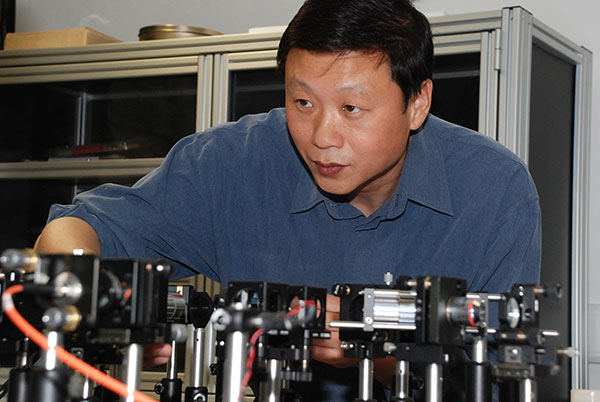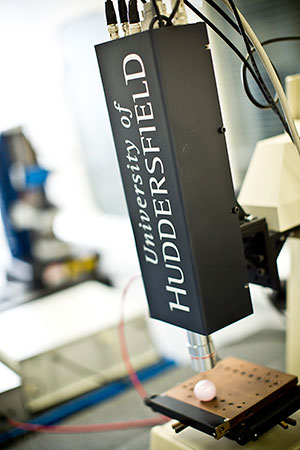Fellowship scheme sees lab technology move to the production line
 Dr Gao’s three-year HVM Catapult Fellowship will see him investigating how to employ the EPSRC Centre’s prototype instruments in the roll-to-roll production line at the Centre for Process Innovation.
Dr Gao’s three-year HVM Catapult Fellowship will see him investigating how to employ the EPSRC Centre’s prototype instruments in the roll-to-roll production line at the Centre for Process Innovation.
Thu, 19 Mar 2015 15:14:00 GMT
Dr Feng Gao receives a High Value Manufacturing Catapult Fellowship to develop nanoscale detection technology for full-scale manufacturing
 The new inferometer developed by Dr Gao can compensate for conditions that include excessive vibrations.
The new inferometer developed by Dr Gao can compensate for conditions that include excessive vibrations.
THE manufacturing environment can be a harsh one for delicate instrumentation. Now a University of Huddersfield scientist has been awarded a government-backed fellowship which will help him to investigate ways in which advanced technology can make a transition from the controlled conditions of a laboratory to a factory production line.
Senior Research Fellow Dr Feng Gao has received his award under a project, operated by Innovate UK, named the High Value Manufacturing Catapult, which is described as “the catalyst for the future growth and success of manufacturing in the UK”. Fellowships awarded in connection with the scheme are funded by the Engineering and Physical Sciences Research Council (EPSRC) and are designed to help companies of all sizes incubate and develop new technologies through to commercial reality.
 The Centre for Process Innovation (CPI), based in County Durham, is part of the HVM Catapult and its specialities include printable electronics, such as rolls of flexible solar panels, embedded with photovoltaic cells.
The Centre for Process Innovation (CPI), based in County Durham, is part of the HVM Catapult and its specialities include printable electronics, such as rolls of flexible solar panels, embedded with photovoltaic cells.
Researchers at the University of Huddersfield’s EPSRC Centre for Innovative Manufacturing in Advanced Metrology have been playing an important role in improving the quality control and reliability of these flexible solar panels, so that they can be manufactured more efficiently and economically.
Under an EU Framework Seven research programme, named NanoMend, the EPSRC Centre has developed new technologies for the detection, cleaning and repair of micro and nanoscale defects in the thin films that are vital in printed electronic products, using an award-winning Wavelength Scanning Interferometer, which can detect defects in the coatings of roll-to-roll flexible photovoltaic cells.
Dr Gao’s three-year HVM Catapult Fellowship will see him investigating how to employ the EPSRC Centre’s prototype instruments in the roll-to-roll production line at the Centre for Process Innovation.
Lab technology for the production line
 It is a challenging project, says Dr Gao. Instruments normally used in an optical lab, where they are stabilised and protected, now have to be adapted so that they can be embedded into a round-the-clock factory production line, with conditions that can include a great deal of vibration. Also, the roll-to-roll films are produced at great speed, adding to the difficulty of monitoring for defects.
It is a challenging project, says Dr Gao. Instruments normally used in an optical lab, where they are stabilised and protected, now have to be adapted so that they can be embedded into a round-the-clock factory production line, with conditions that can include a great deal of vibration. Also, the roll-to-roll films are produced at great speed, adding to the difficulty of monitoring for defects.
Dr Gao has responded by developing a new inferometer that can compensate for the levels of vibration and during his Catapult Fellowship, which lasts until 2016, he will pay repeated visits to the CPI to witness the processes at first hand.
Dr Gao has well-established expertise in the research and development of industrial measuring instruments, laser interferometry, coordinate measuring machines, scanning probe microscopy and scanning white light interferometry. He has published over 50 academic papers. In addition to his work on the HVM Catapult Fellowship, Dr Gao’s current research includes the use of optical deflectometry as a means of measuring complex freeform surfaces such as lenses.







